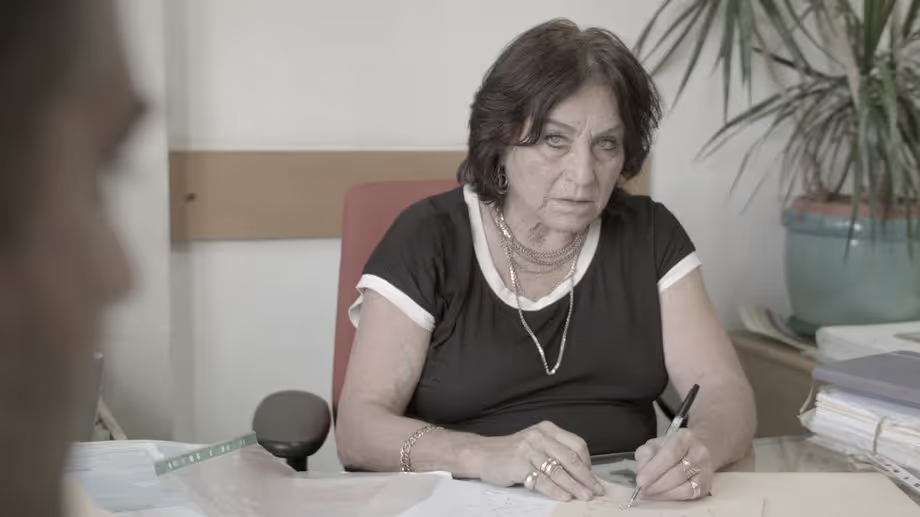Advocate: Perceptions of Justice Film Clips
Film Clips

Clip 1: Lea Tsemel: Devil’s Advocate (4:40 - 6:30, length: 1:50 minutes)
In an interview, Lea Tsemel responds to questions from a single-minded television host.
In this clip, we learn that Lea Tsemel is a controversial figure in Israel because she is a Jewish-Israeli who defends Palestinian people who resist the occupation, whether they do so through violent or non-violent means. The host raises names that Lea is called [“Traitor, leftist, devil’s advocate”] by those who disagree with her work, who the host seems to perceive to be all Israelis. Lea tries to shift the conversation to encompass broader perspectives. The scene raises some critical dichotomies that exist in the context of the conflict, for example whether violent Palestinian protesters are seen as “terrorists” or as “freedom fighters.” Lea states she does not feel she has the right to judge how Palestinians resist, a point that is central to her worldview and her concept of justice.
Clip 2: Experience of 1967 (14:55 - 18:41, length: 3:46 minutes)
The results of the 1967 war remind Lea of her own family’s history fleeing the Holocaust.
As a college student in Jerusalem, Lea Tsemel witnessed the 1967 war that resulted in Jewish forces taking East Jerusalem, including what is now known as the Wailing Wall, an important religious site for Jewish people. At the time, she believed the war would bring togetherness and peace. When she saw Palestinian people fleeing Jerusalem for Jericho, she was reminded of “The Wandering Jew,” a work of art that hung on her family’s wall depicting their legacy of exile, including from pre-Holocaust Europe. After the Old City of Jerusalem was settled, she returned to find the neighborhoods around the Wailing Wall cleared, and she realized that the Palestinians who had lived there had been displaced. She recalled, too, the experience of Palestinian displacement from her home city of Haifa in 1948, and decides to join a leftist political party called Mazpen.
Clip 3: Lea’s ‘Red Lines’ (40:01 - 40:53, length: 0:52 minutes)
Lea talks about why she’ll defend any Palestinian who resists the occupation.
In this clip, we hear Lea Tsemel describing how she thinks about defending Palestinians. Specifically, she says that as a person who “enjoys the fruits” of the Israeli occupation, she doesn't feel she has the right to dictate how the people living under that occupation should resist. She offers an example that a non-violent protester might be shot, where one with a knife may be arrested. She doesn't feel she has the right to judge which is “good” and which is “bad.”
Clip 4: A Big Problem in Human Terms (25:10 - 29:01, length: 3:51 minutes)
Lea works with a client’s family to decide on the best of his bad legal options.
Lea defends a young Palestinian boy named Ahmad. Ahmad, 13 years old, is on trial for stabbing a 13 year old Jewish boy in the marketplace. Ahmad insists his intention was not murder, but to scare Jewish people in the market as an act of resistance. Lea, Ahmad, and his family must decide strategically how to proceed - if he confesses to attempted murder, he may be sentenced as a child and serve a term in juvenile detention. If he does not, his trial will likely take longer and he will turn 14. At that time, if he is found guilty of attempted murder, he will be sentenced as an adult and serve time in an adult facility. The case has attracted national attention, and Lea watches footage of Ahmad’s interrogation on the evening news, and sarcastically remarks, “The interrogation of a kid with a cracked skull.”
Clip 5: She Was Very Human (48:32 - 51:59, length: 3:27 minutes)
Palestinian Hanan Ashrawi talks about Lea’s ability to understand violence within context.
In this clip, Lea Tsemel describes her sense of personal responsibility to her clients - she feels she can’t leave them to suffer, and even be tortured in prison, so she keeps in touch with them and their families. Her friend, Palestinian scholar and legislator Hanan Ashrawi, describes the closeness of their relationship and how unusual it is to know a woman who believes so whole-heartedly and unapologetically in her work. Hanan explains that Lea has the ability to understand why a person living under occupation would resist violently, because she deeply understands that the occupation is, itself, a larger form of violence.
Clip 6: I’ll Force Them to Change (1:18:44 - 1:20:46, length: 2:00 minutes)
Lea says Ahmad’s loss is ‘long-lasting for Israeli society and its judicial system.’
In this final clip, Ahmad is found guilty of attempted murder and sentenced to 12 years in an adult correctional facility. Lea gives a press briefing in which she denounces the finding. She explains her commitment to justice is ongoing, despite multiple defeats. She believes that her work will eventually force the legal system to acknowledge the history of the occupation and its effect on Palestinians, and to enact justice in a way that works towards a more equitable future for Israel.

